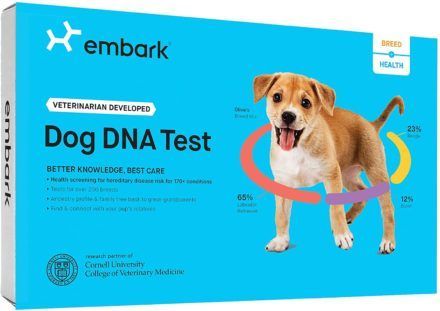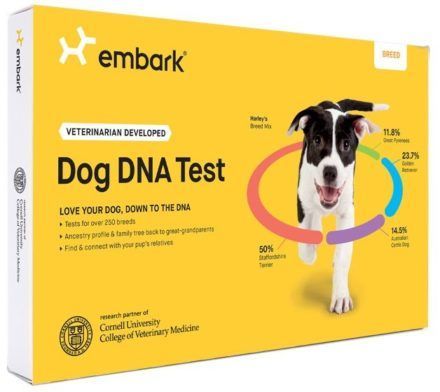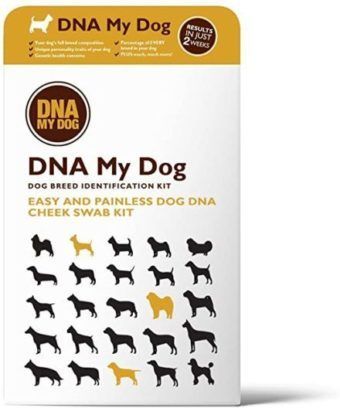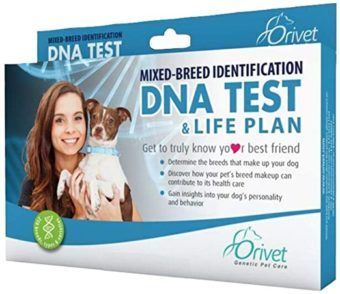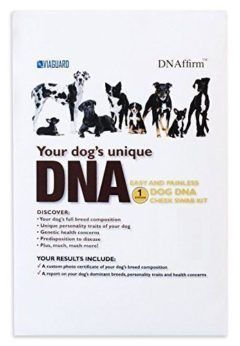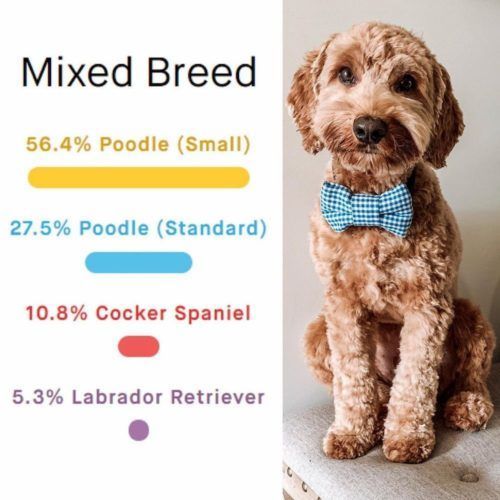The Best Dog DNA Tests Review
Written by:
Author: Vicki Smirnova
Vicki Smirnova is a professional writer and editor who adores animals and helps readers get along well with their pets. She has been working in digital media for more than 5 years and has great experience writing content about lifestyle, including pets. Vicki specializes in dog health and nutrition, cat feeding, dog training. She is an aquarium lover and is passionate to write about fish care at home. Also, Vicki headed several websites and worked as a news editor.
View all 244 articlesLearn about our editorial process and veterinary review board.
Reviewed by:
Veterinary review
by Dr. Linda Simon
Dr. Linda Simon is a veterinary surgeon working with seven years of experience. She is a fellow of the British Veterinary Association and specializing in animal medicine. Also, she has been the Woman magazine resident vet for the past two years and writes a regular column for them, focusing on pets and their health.
View all 30 articlesLearn about our veterinary review board
Viewed: 338
Updated on: 03/31/2022
Man and dog have evolved together for more than fifteen thousand years — the bones of dogs were found together with human remains of the Pleistocene period (14,000 years BC). All this time, man has carefully weeded out the negative attributes – and selected the positive ones – for the best human and dog cohabitation i.e. Darwinism/natural selection. It should be noted that man has succeeded in this: the dog, as we know, understands human signals sometimes even better than our closest ancestor – the chimpanzee.
The development of modern dog genetics has led to creating a general structure that consists of relatively closed subgroups, called dog breeds. The traits inherent in each breed can be divided into those that define a specific breed and are intentionally included in the genetic structure and undesirable traits that begin to show up in some breeds.
The Best DNA Test for Dogs Reviews
DNA tests for dogs for home use have only recently become available, but laboratory research has been conducted for almost two decades. Modern scientists claim that these tests are accurate.
Several companies have created top-rated DNA tests that can be performed at home. In this article, we will compare reviews of the best products. Below, we will look at the best identification test.
1. Embark Breed and Health Kit
This DNA test allows the dog owner to learn about the breed of his/her pet, its origin, health and much more. The laboratory’s database contains 350 breeds and more than 190 genetic models for determining health. Embark Breed and Health Kit is the most accurate and highly rated kit on the market.
Key features:
- Allows for an in-depth analysis of origin and health.
- The company has tested 100 times more genes than any other organization.
- The report includes identification of the breed and origin of the pet.
- Can detect more than 160 genetic disorders.
Specification:
- Brand: Embark.
- Model: DNA101.
- Weight: 4 ounces.
Pros
Cons
- Provides an estimate of the genetic age.
- Includes postage.
- Provides an extensive research report.
- Complicated results.
2. Embark Breed Identification Kit
The most reliable test helps you find out a breed, origin and more. Get to know your dog better with Embark. This product includes everything you need for taking a sample of genetic material. The company uses an extensive database to compare the genetics of the pet and provides free shipping across the United States mainland.
Key features:
- Database of 350 breeds.
- Positive customer feedback that Embark is the most accurate dog DNA analysis.
- Quick results in 1-3 weeks.
- Free replacement if damaged.
- Live chat or email for consultation.
Specification:
- Brand: Embark.
- Model: DNA101.
- Weight: 4 ounces.
Pros
Cons
- Provides an estimate of genetic age.
- Includes postage.
- Provides an extensive research report.
- Complicated results.
3. Wisdom Panel Dog DNA Test Kit
The Wisdom Panel 3.0 DNA test allows you to determine the breeds and origin of your pet. To take the genetic material, run a swab over the dog’s cheek and send it for analysis. The research results will be ready in 2-3 weeks. The company owns a database with more than 250 breeds. The product can check for genetic mutations. Tests of purebred and designer (hybrid) dogs will also provide a diagram that compares your pet with others of the same breed. There is no need to take a blood test from a veterinarian. To collect the genetic material, you will only need a DNA swab.
Key features:
- Database contains more than 250 breeds, including 99% of AKC recognized breeds.
- Helps uncover the genetic origins of your pet.
- Provides a weighted forecast for making the right diet.
- Includes a test for genetic mutations.
- Provides an extensive pedigree of the pet.
Specification:
- Brand: Wisdom.
- Model: 07639.
- Weight: 0.64 ounces.
Pros
Cons
- Health check optional.
- Charitable partnerships with animal rights organizations.
- Results in 2-3 weeks.
- Free consultation by phone and email for any questions.
- Smears can irritate the dog’s gums.
4. DNA My Dog Breed Identification Test Kit
My Dog Breed DNA testing kit helps the owner satisfy his/her curiosity. The test can determine the breed and origin of your pet, and you will also learn about potential personality characteristics and health issues worth paying attention to. The product is painless and straightforward – just wipe the cheeks with the attached sterile applicator and send the material for examination. Soon, you will receive a report, containing information about the history of its breed, character traits and more – on the unique genetic origin of your pet.
Key features:
- Helps determine the origin of the pet.
- Improves the understanding of potential personal characteristics and health problems.
- Helps determine how to train and feed your four-legged friend.
- Simple and painless taking of genetic material.
Specification:
- Brand: DNA My dog.
- Weight: 1.6 ounces.
Pros
Cons
- Checks DNA for genetic mutations.
- Quick results.
- Health check optional.
- Database of 100 breeds.
5. Orivet Mixed-Breed Identification Dog DNA Test Kit
The Orivet test will help you learn about your dog’s breed, increase your understanding of the pet’s origin and help the owner better understand the health risks specific to certain breeds. The kit report includes a personalized life plan, containing detailed information about inherited health risks. The report includes recommendations on how to care for your pet.
Key features:
- Helps to determine the breed of the pet.
- Includes a report on the 3rd generation ancestral tree.
- Helps you understand a personality and behavior.
- Informs you about inherited health risks for your puppy.
Pros
Cons
- A health test is a necessary analysis.
- Genetic testing of mutations for more than 150 health conditions.
- Identifies potential health risks.
- Consumers report excellent customer support.
- Results are emailed within 3 weeks.
- You must order two separate tests to get results for both breed and health status.
6. DNAffirm DNA Dog Breed Test
Most buyers said that the information in the report was scientific, logical and very clear. Pet owners claimed that the DNA identification kit significantly helped them make the right decision about caring for their pets. Buyers also claimed that this was the most economical test to determine the breed of their dog.
Key features:
- Determines the origin of the dog.
- Quick and painless sample collection.
- Helps you create an individual life plan for your pet.
- Helps determine the risks to the health.
Specification:
- Brand: DNAFfirm.
- Weight: 1.3 ounces.
Pros
Cons
- Inexpensive.
- Includes two tests for genetic disorders (MDR1: Multi Drug Resistance and EIC: Exercise Induced Collapse).
- A certificate of your pet’s breed will be attached to the results report.
- Some report that the test gave inaccurate results.
*All ratings are formed by the article’s author based on own research and combined with customer reviews.
Final Verdict
The best general analysis of a dog’s DNA is the Embark Breed & Health Kit. Embark provides breed information about your pet’s ancestors and can also determine your dog’s predisposition to various diseases. This DNA test can replace many laboratory tests; moreover, you will better understand the character of your pet.
This product is made in collaboration with the Cornell University College of Veterinary Medicine.
Overall, most customers were delighted with the results, as well as customer service. The research report contains detailed results with clear visuals and diagrams.
“The Embark DNA Suite provided almost the same amount of information as the human DNA Suite. It even included a diagram of the exact breakdown of each of our dog’s 38 pairs of chromosomes!” – Suzie Dundas, The Tester Products.
Buying Guide
Why Bother Testing Dog’s DNA?
In the last few hundred years, there has been active development of new breeds. Dogs have more than 400 genetic breeds, with significant morphological and behavioral diversity. Strict natural selection has led to shallow genetic diversity and the development of many inherited diseases. Hereditary diseases can be detected and potentially bred out of the species in time, thanks to dog DNA tests. [1]
Determining the pedigree of a mixed breed is difficult, even for dog experts, since there are many more genetic combinations in mixed breeds than in purebreds. For example, two black, mixed breeds with recessive genes that give light color can produce offspring entirely different from their parents. It has been claimed that even professionals can determine parent breeds with only 25% accuracy based on visual characteristics.
Only a few genes control a physical appearance – about 2% – and it is essential to understand dominant and recessive genes. Recessive genes need two copies (one from each parent) for the relevant characteristic to manifest, whereas dominant genes only need one. Dominant genes, such as short black hair, floppy ears, or cubic head shape, suppress recessive genes, such as long hair, straight ears, or a fawn color; found only in some species. Thus, the observer may not easily recognize the breed, whose main characteristics are hidden under the second parent’s dominant genes. Some breeds’ features, e.g. the flat face of a bulldog or the crooked tail of a pug, rarely survive the first crossing when out bred to a different breed. Moreover, dominant traits can be attributed to hundreds of different breeds beyond those that come to mind. [3]
With the help of the best dog DNA kit, you can get a much better idea of the breeding history of the selected dog; i.e., the breed of the tested dog’s parents, grandparents, and great-grandparents. However, the test will not help determine the personality or, for example, the potential for aggression, since each animal is unique and its physical and behavioral qualities are the result of several factors, including genetics, training, handling, and environment.
Nowadays, genetic analysis of blood samples and smears is widely available. The companies claim that their DNA-based diagnostic tests can genetically determine a mix of hybrid breeds. The best product allows pet owners, veterinarians, and breeders to learn about dog disease pedigree and risk. Like human genetic tests, saliva or blood are analyzed.
The purpose is to improve pet owners’ understanding of their pet’s health and provide information for breeders about preventative care. For example, the test can determine which dog may be a carrier of a particular disease.
Owners can bring the test results to the veterinarian to discuss potential health problems. For example, a breed like the Boxer is prone to cancer. Knowing the potential risks in advance – and periodically checking with a veterinarian – can potentially save the life of your loyal friend.[2]
The creators of the dog DNA test Wisdom Panel is considering using it to create products that specialize in particular breeds. For example, dogs predisposed to arthritis could be put on specific diets and joint supplements to protect against the disease’s progression.
How Does Dog DNA Testing Work?
DNA testing is an analysis of the dog’s genetics, which requires a sample of blood or buccal epithelium collected using special buccal brushes. A blood sample must be taken by a veterinarian, while a DNA sample of buccal epithelial cells can be obtained independently by the owner. Several laboratories provide genetic testing services for dogs, but most of them only perform DNA analysis for specific diseases or mutations associated with an inherited disease or characteristic feature. Research confirms that instead of conducting single tests, full-scale DNA analysis, which covers all 39 pairs of dog chromosomes, which contain approximately 2.4 billion nucleotides, is a very useful tool and, in the future, will be the main way to test dogs and identify genetic sequences associated with the risk of hereditary diseases.
Each DNA test contains equipment for sampling the dog’s genetic material. To get accurate results, it is essential to make sure that your pet did not eat, drink, or contact other dogs for two hours before the test.[4]
The DNA samples are then sent to the laboratory. Experts manually extract the DNA and a computer algorithm compares it with data from their DNA database. After the analysis, the laboratory sends all the studied information to the consumer. The processing time may vary; on average, the results are returned after 6 weeks.
Here is an example of a breed definition:
How Accurate are Dog DNA Tests?
Companies that provide the best dog genetic testing services state that their results are 95-99% accurate. However, there is still some possibility of human error when taking the sample.
The company Embark has a database of more than 250 dog breeds, Wisdom – about 350 breeds, and DNA My Dog – about 100 breeds.
When choosing a DNA test for your dog, you should pay attention to the following things:
- Depth of research. If you are just curious about your dog’s origin, then the basic tests will suit you. However, if you need to determine the predisposition to diseases and the like, it is worth paying attention to more in-depth research.
- Speed of research. If you need results as soon as possible, some tests will be ready in a couple of weeks. However, some companies may need months to determine results.
- Level of accuracy. The higher the percentage of accuracy of the study, the more accurately experts will determine the breed and possible diseases of your pet. Some tests guarantee a level of accuracy of almost 100 percent.
READ MORE: Shots that puppies need
How much does it cost for a dog DNA test?
The cost of high-quality dog DNA tests ranges from $60 to $170 (and higher, depending on the laboratory). The cost is low, since a visit to the veterinarian is not required, and the pet owner takes the sample at home themselves.
Are DNA tests worth the expense?
With the help of DNA tests, the owner can detect threats to the pet’s health and life in time to initiate the proper preventative care and to possibly save a large amount of money on the treatment of the dog.
Knowledge of the genetic characteristics of the dog can help the owner to make a proper plan for nutrition and pet care.
If the test shows the potential to develop a disease, then you should immediately consult with your veterinarian about preventive measures. The earlier you treat the disease, the better the results.
Also, DNA tests are useful for breeders who earn money by selling pedigreed dogs. Breeders can also prevent the creation of individuals who carry diseased genes by removing those with bad genetics from their breeding pools, meaning healthier dogs in future generations.[5]
READ MORE: Raising a Puppy Guide
The Best Dog DNA Kits – FAQ
🐩 How long does ancestry DNA lab processing take?
It is challenging to identify all the breeds involved in forming the unique appearance and character of a pet. On average, it takes six to eight weeks after receiving a sample to process a pet’s DNA. Specifically, the time depends on the chosen company and the characteristics of the dog.
🐾 What does a dog DNA test tell you?
Tests can help you find out information about the pet’s breed and breeds of its parents, grandparents and great-grandparents: the parent’s contribution to DNA is 50%, the progenitor’s contribution is 25% and the great-grandparent’s contribution is 12.5%. The test can also reveal information about proper body weight and size. In purebred dogs, a comparison can be made with the average dog of the breed. The tests also provide information about possible genetic diseases.
🐕 Can dog DNA tests help with obedience training?
Dog DNA tests may help with obedience training, but owners must understand that personality traits such as obedience do not depend solely on genetics. The owner, having learned about the breed of dog, will be able to develop a more accurate, individual training program for the level of energy and mind of the dog.
Article Sources:
- Lau, Edie. “Dog Breed Genetic Tests Put to the Test.” VIN News Service, https://news.vin.com/default.aspx?pid=210&catId=613&id=5450068.
- Shaffer, Lisa. “Standards and Guidelines for Canine Clinical Genetic Testing Laboratories.” Human Genetics, 13 Nov. 2018, link.springer.com/article/10.1007/s00439-018-1954-4.
- Schmutz, S. M., and T. G. Berryere. “Genes Affecting Coat Color and Pattern in Domestic Dogs: A Review.” PubMed, 1 Dec. 2007, pubmed.ncbi.nlm.nih.gov/18052939/.
- Kaelin, Christopher B., and Gregory S. Barsh. “Genetics of Pigmentation in Dogs and Cats.” Annual Reviews, annualreviews.org/doi/abs/10.1146/annurev-animal-031412-103659.
- Thalmann, Olaf, and Angela R. Perri. “Paleogenomic Inferences of Dog Domestication.” Springer Link, link.springer.com/chapter/10.1007%2F13836_2018_27.
 Dog Products & Toys Reviews The 6 Best CBD Oils for Dogs with Arthritis: Reviews & Guide
Dog Products & Toys Reviews The 6 Best CBD Oils for Dogs with Arthritis: Reviews & Guide - 133
- 0
 Dog Products & Toys Reviews The 10 Best Brush for Australian Shepherd: Review and Buying Guide
Dog Products & Toys Reviews The 10 Best Brush for Australian Shepherd: Review and Buying Guide - 13353
- 0
 Dog Products & Toys Reviews Trudog Dental Spray Review: Is It Best For Bad Breath and Tartar? (Vet Approve
Dog Products & Toys Reviews Trudog Dental Spray Review: Is It Best For Bad Breath and Tartar? (Vet Approve - 337
- 0
 Dog Products & Toys Reviews The 10 Best Brush for Australian Shepherd: Review and Buying Guide
Dog Products & Toys Reviews The 10 Best Brush for Australian Shepherd: Review and Buying Guide - 13353
- 0











